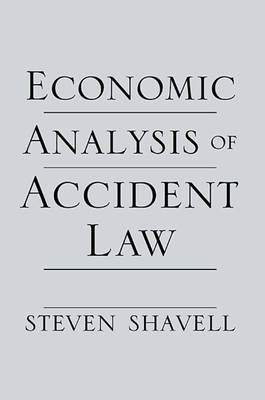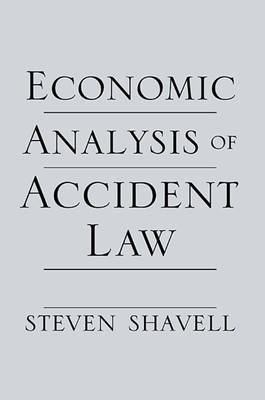
Door een staking bij bpost kan je online bestelling op dit moment iets langer onderweg zijn dan voorzien. Dringend iets nodig? Onze winkels ontvangen jou met open armen!
- Afhalen na 1 uur in een winkel met voorraad
- Gratis thuislevering in België vanaf € 30
- Ruim aanbod met 7 miljoen producten
Door een staking bij bpost kan je online bestelling op dit moment iets langer onderweg zijn dan voorzien. Dringend iets nodig? Onze winkels ontvangen jou met open armen!
- Afhalen na 1 uur in een winkel met voorraad
- Gratis thuislevering in België vanaf € 30
- Ruim aanbod met 7 miljoen producten
Zoeken
Omschrijving
"[This] is certainly a masterpiece."--Thomas S. Ulen, Journal of Economic Literature
"The strength of Shavell's book is its lucid, structured development and explication of the economic model. It represents the best systematic presentation of the relevance of economic argument for issues of risk allocation."--Jules L. Coleman, Yale Law Journal "Steven Shavell...[has] drawn upon [his] previous path-breaking work to issue [one of] the most important books in the law and economics of tort law since the release in 1970 of Guido Calabresi's The Costs of Accidents...The work is a masterful tribute to the power of economic modelling and the use of optimization techniques...I, for one, was immensely impressed by the richness of the insights that Shavell's theoretical approach provided into the fundamental issues of tort law."--John J. Donohue III, Harvard Law Review Accident law, if properly designed, is capable of reducing the incidence of mishaps by making people act more cautiously. Scholarly writing on this branch of law traditionally has been concerned with examining the law for consistency with felt notions of right and duty. Since the 1960s, however, a group of legal scholars and economists have focused on identifying the effects of accident law on people's behavior. Steven Shavell's book is the definitive synthesis of research to date in this new field.Specificaties
Betrokkenen
- Auteur(s):
- Uitgeverij:
Inhoud
- Aantal bladzijden:
- 320
- Taal:
- Engels
Eigenschappen
- Productcode (EAN):
- 9780674024175
- Verschijningsdatum:
- 1/03/2007
- Uitvoering:
- Paperback
- Formaat:
- Trade paperback (VS)
- Afmetingen:
- 166 mm x 228 mm
- Gewicht:
- 439 g

Alleen bij Standaard Boekhandel
+ 159 punten op je klantenkaart van Standaard Boekhandel
Beoordelingen
We publiceren alleen reviews die voldoen aan de voorwaarden voor reviews. Bekijk onze voorwaarden voor reviews.











